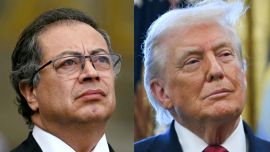Argentina is looking to press on with debt talks despite delays caused by the global coronavirus pandemic.
The government is continuing negotiations with bondholders this week and next, and looking to present an offer at some point after that, Economy Minister Martín Guzmán told reporters. He declined to comment on drafts of the offer or whether certain bonds will receive differential treatment.
Argentina is seeking to renegotiate US$69 billion in overseas debt, a process that began before the virus led to a historic crash of global markets. Argentina had originally said it hoped to reach an agreement with private creditors by March 31, but later conceded that the deadline might be altered. Its original schedule called for a debt offer and roadshow on the third week of March.
“We’re looking to launch an offer very quickly,” Guzmán said. “We’re working with urgency to reach a successful exchange.”
Argentina is also willing to consider issuing “contingent instruments” in which debt payments would be tied to the country’s growth, if the market finds value in it, Guzmán said. In its 2005 and 2010 restructurings, Argentina issued sweeteners known as GDP warrants, which trigger a payment when economic growth meets a certain threshold.
The government is in talks with the International Monetary Fund to enter a new program after deeming that it won’t be able to follow the conditions of a previous US$56-billion agreement. That will require IMF officials to carry out an Article IV review, but may also be delayed as those reviews are currently on hold because of the virus, Guzman said.
Argentina, which also has large payments in local-law, dollar-denominated debt will look to roll over those payments as with other local bonds. That process will follow the foreign debt offer because of procedural reasons, the minister added.
Prices of Argentine bonds, which have been trading at distress levels since the latter part of last year, have plunged even lower amid the delays in the talks and the pandemic-related global sell-off. Argentina’s longer-dated dollar bonds trade near 20 cents on the dollar. Part of the reason is the dwindling trading volume, Guzman said.
“The bond prices reflect what creditors believe to be the recovery values at a certain moment,” he said. “There is a drop in transaction volumes. There is a lot of disparity in terms of expectations.”
The country presented the macro expectations it’s working with March 20, which don’t take into account the effects of the virus. The economy minister said he expects only those for 2020 and 2021 would need to be updated as the medium-term view will hold. Among decisions to shore up the economy due to the virus, measures to support income losses have a cost of 0.2 percent of gross domestic product per month, he said.
“It’s unclear around the world how persistent this shock will be,” Guzmán said. “The implications for fiscal results will depend on the persistence of the shock.”
Here are the debt guidelines published by the government March 31:
- The government will seek a grace period as it aims to return to accumulating reserves, with a goal of US$65 billion in foreign reserves by 2024. (Argentina had US$44 billion in reserves as of March 25)
- Argentina expects to “substantially” reduce bond coupons in the medium and long term
- The country aims to limit debt servicing in the medium and long term, either through extensions on maturities or reductions on nominal amounts on the debt
- The government is weighing “contingent value-recovery mechanisms”
- The bond operation’s exit yield must lead to a sustainable outcome, with a high yield suggesting the need for lower coupon payments, longer grace periods, or longer extensions to capital payments
- From 2027 on, the government has among assumptions that its debt needs will be 40 percent in pesos and 60 percent in foreign currency
- Argentina assumes that medium and long term will be financed at an average rate of 5% in real terms until 2034 and 4.5 percent from 2035
by Carolina Millan, Bloomberg




















Comments